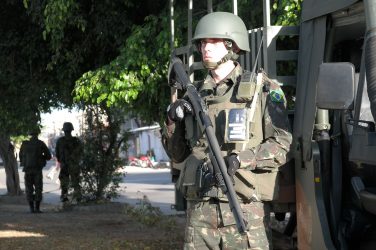On 15 February 2017, the Saudi Arabia-led coalition fired Brazilian-manufactured cluster munitions on three residential areas in Saada City in Yemen, maiming two civilians, according to Amnesty International. This is the third confirmed use of Brazilian-manufactured cluster munitions in Yemen. Yet, the government of Brazil remains silent.
“I strongly condemn the use of cluster munitions in Yemen and urge the Saudi-led coalition to halt the use of any and all cluster munitions,” said Megan Burke, Director of the Cluster Munition Coalition.
“I urge the government of Brazil to condemn the use of cluster munitions in Yemen, to renounce the internationally banned weapons and cease all production and transfers, and to join the 2008 Convention on Cluster Munitions without further delay.”
According to an investigation by Human Rights Watch and research by Amnesty International, several civilians were killed or injured by Brazilian-manufactured cluster munitions in Yemen in 2016. Other investigations have also confirmed the use of US and UK-made cluster bombs in Yemen.
Brazil has been a significant producer and exporter of cluster munitions, and maintains a stockpile of the weapons, according to the Cluster Munition Monitor.
ASTROS II, the cluster munitions used in Yemen were manufactured by Avibrás Indústria Aeroespacial SA. Bahrain and Saudi Arabia have purchased ASTROS cluster munition rockets from Brazil.
The Saudi- coalition is comprised of Bahrain, Egypt, Jordan, Kuwait, Morocco, Qatar, Sudan and the United Arab Emirates.
Today Cluster Munition Coalition sent a letter to Mr. Aloysio Nunes Ferreira, the Foreign Minister of Brazil to express its concern and to urge the country to take action.
119 nations have joined the Convention on Cluster Munitions, of which 100 are States Parties and the remaining 19 are signatories that have yet to ratify.
The convention comprehensively prohibits the use, production, transfer and stockpiling of cluster munitions, as well as assistance with any of these banned activities, and require that stockpiled cluster munitions be destroyed within eight years.
The convention requires the clearance of areas contaminated by cluster munition remnants within ten years, and assistance to fulfill the rights of victims of cluster munitions.
The convention also calls on countries in a position to provide assistance to help others fulfill their obligations.
The Letter Sent Brazil’s Foreign Minister:
9 March 2017
H.E. Aloysio Nunes Ferreira
Minister of Foreign Affairs
Ministry of Foreign Affairs
Palácio do Itamaraty
Brasília
BRAZIL
Your excellency,
I am writing on behalf of the Cluster Munition Coalition, a group of non-governmental organizations in 100 countries working to end the suffering caused by cluster munitions.
The CMC is concerned about evidence demonstrating that civilians in Yemen are being harmed by Brazilian-made cluster munition rockets used by the Saudi Arabia-led coalition of nations that has conducted a military operation in the country since March 2015.
We urge the government of Brazil to condemn this use of cluster munitions in violation of international humanitarian law and immediately cease all production and transfer of cluster munitions. We call on Brazil to accede to the 2008 Convention on Cluster Munitions without delay.
According to a new report by Amnesty International, the Saudi-led coalition fired ASTROS cluster munition rockets on 15 February into residential areas of the northern Yemeni city of Saada injuring two civilians and damaging homes as well as cemeteries and farms.
It also reported another ASTROS cluster munition rocket attack in late January in Abdeen, five kilometers south of Saada City.
This is unfortunately not the first time that Yemeni civilians have been harmed by Brazilian-made cluster munitions. According to a Human Rights Watch investigation, two civilians were killed and at least six wounded when ASTROS cluster munition rockets struck near two schools in Saada City on 6 December 2016.
Amnesty International researchers found remnants of ASTROS cluster munition rockets after a 27 October 2015 attack on Ahma in Saada governorate that wounded at least four people.
Manufactured by Avibrás Indústria Aeroespacial SA, ASTROS II surface-to-surface rockets each contain up to 65 submunitions and are delivered by a truck-mounted multi-barrel rocket launcher. Bahrain and Saudi Arabia have purchased ASTROS cluster munition rockets from Brazil.
Given the indiscriminate nature of cluster munitions both at the time of attack and for many years after its use, a total of 119 countries have prohibited these weapons through the Convention on Cluster Munitions, which also requires clearance of cluster munition remnants and assistance to victims of these weapons.
Yet Brazil has remained silent in condemning cluster munition use in Yemen. In 2015 and again in December 2016, Brazil abstained from the vote on a United Nations General Assembly resolution supporting the Convention on Cluster Munitions, which some 140 countries voted for, including several non-signatories.
Brazil must take action to renounce cluster munitions or face international condemnation and other repercussions.
We look forward to your prompt action on this serious issue and are available to discuss it with representatives of the Permanent Mission of Brazil to the United Nations in Geneva.
Sincerely,
Megan Burke
Director, Cluster Munition Coalition
Cc: H.E. Ms. Maria Nazareth Farani Azevêdo, Ambassador and Permanent
Cluster Munition Coalition – http://www.stopclustermunitions.org














